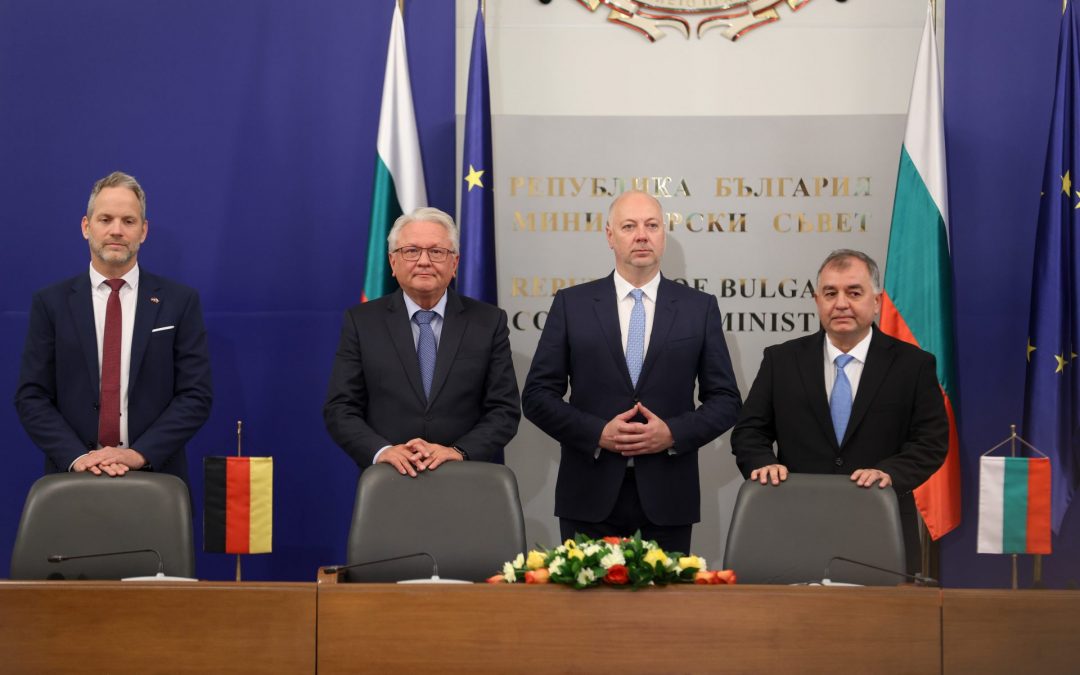SOFIA – Bulgaria and the German technology group “Rheinmetall” announced the start of the project to build a factory for gunpowder and ammunition at an official ceremony in the Council of Ministers in Sofia. The investment of nearly one billion euros is among the most significant in recent years and is a key step in modernizing the Bulgarian defense industry, the government press service reported. The statement added that the investment is also part of the efforts of the European Union and NATO to strengthen defense capabilities and the strategic autonomy of Europe in the context of the changed geopolitical environment.
Bulgaria will become a center of competence in the defense industry for all of Europe. This was stated by the CEO of “Rheinmetall” Armin Papperger during the signing of the project for the construction of a gunpowder and ammunition factory. At an official ceremony in the Council of Ministers, the CEO of “Rheinmetall” Armin Papperger and the director of the “Weapons and Ammunition” department of the group Roman Kione signed the contract. From the Bulgarian side, the contract was signed by the CEO of “Vazovski Machine-Building Plants” (VMZ) Ivan Getzov.
The ceremony was attended by Prime Minister Rosen Zhelyazkov, the Deputy Prime Minister and Minister of Innovation and Growth Tomislav Donchev, and the Minister of Economy and Industry Petar Dilov. The leader of GERB and chairman of the parliamentary group of GERB-SDS Boyko Borissov also attended the signing, as well as the ambassador of Germany to Bulgaria Irene Plank.
“The speed at which Bulgaria is acting is unprecedented. It is incredible how much effort your team has put into this cooperation,” said the CEO of “Rheinmetall”. Papperger recalled that the cooperation began in February at the Munich Security Conference. According to him, with the implementation of the project one of the most modern factories in the world for the production of gunpowder and ammunition will be created. “We will build a huge production capacity – 100 thousand 155-millimeter shells annually, which will be exported over the next 10 years. The European Union and NATO need millions of such shells, and according to our calculations, the alliance will need about 50 million,” noted Papperger.
Prime Minister Rosen Zhelyazkov described the project as a huge advancement in Bulgaria’s industrial and defense capabilities. Minister of Economy Petar Dilov said that the foundations of a partnership that combines Germany’s technological expertise and Bulgaria’s industrial potential to build a more secure future for Europe are being laid. He added that this is a strategic project not only for Bulgaria but for all of Europe, which will enable the establishment of a sustainable and independent defense capacity in support of the security of the entire region. Dilov noted that the project is part of the common conditions of the EU and NATO for strengthening defense capabilities and the strategic autonomy of Europe in the context of the new geopolitical reality.
Building modern defense capabilities for the Bulgarian army and developing a strong, competitive Bulgarian defense industry has always been my priority, commented the contract to journalists in Riyadh President Rumen Radev, who is on a visit to Saudi Arabia. The head of state added that with this goal in mind, at the beginning of the year, during the Munich Security Conference, he held a meeting with Armin Papperger. I convinced him to come to Bulgaria, I invited him to the presidential institution, where we presented the full range of opportunities of our defense industry. I organized meetings for him with the Bulgarian government, added Rumen Radev. We need new technologies and partnerships with our strategic partners, but I expect Bulgarian interests to be protected as well. This is the government’s responsibility – how it signs such agreements and how it implements them, Radev further stated. (October 28)
 go to the original language article
go to the original language article
